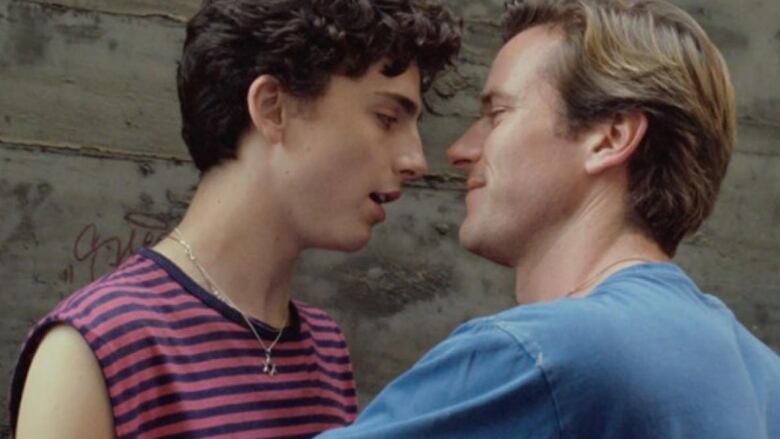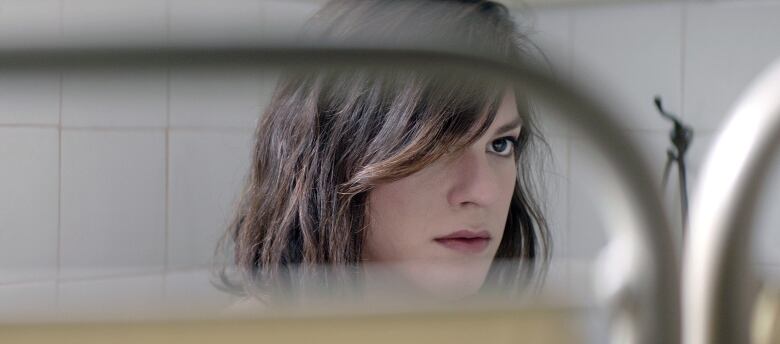Just peachy: Queering the exceptionally LGBTQ-inclusive 2018 Oscar nominations
From Call Me By Your Name to A Fantastic Woman, It was a very big day for LGBTQ stories and artists

Queeriesis a weekly column byCBCArts producerPeter Knegtthat queries LGBTQ art, culture and/or identity through a personal lens.
One of my biggest fears heading into the Oscar nominations this morning was thatLuca Guadagnino'struly transcendent Call Me By Your Name would somehow miss out on a best picture nomination, perhaps in part because voters felt like Moonlight's win last yearpunched "the gaycard" for at least a few years. That might sound like aridiculous notion, but it's one that had been vocalized by Oscar voters to an openly gay journalist, and if you think about the voting membership still very old, white and straight despite aggressive measures to diversify in recent years it's really not all that hard to believe. CallCMBYNa "universal love story" all you want, but it's still very much a movie in which masturbating into a peach plays a seminal role in a sexual relationship between two men that many countries (including Canada) would still consider illegal because one is 17 and the other is 24. Call me old-fashioned, but I still questioned whether the Oscars were ready for that jelly.
But as it turns out, things were more peachy with Academy voters than I feared. Call Me By Your Name was nominated for best picture, as well as best actor (Timothe Chalamet), best adapted screenplay (James Ivory) and best original song (Sufjan Stevens). Would I have loved to see supporting actor nods for Michael Stuhlbarg and Armie Hammer too? Of course, and same goes for LucaGuadagninofor bestdirectorand Sayombhu Mukdeeprom for best cinematography. But I think it's finally time to let go of the12-year-grudge I've held against the Academy since their internal homophobia unquestionably led to Crash's mind-boggling win over Brokeback Mountain.
It's not just about the potential for LGBTQ-positive speeches to make their way to the living rooms of people who need to hear them. It's about a mainstream institution like the Academy of Motion Picture Arts and Sciences finally recognizing LGBTQstories and artists.- Peter Knegt
If you're rolling your eyes right now at how seriously I'm taking an awards show, consider their impact for a moment. The Oscars are watchedby millions of people around the world, including many a few queer kids in the midst of trying to figure themselves out. I was one of them in 1994, when I watched Tom Hanks' acceptance speech for Philadelphia in the company of my entire family. In the speech, Hanks thanks a former teacher and a former classmate, calling them "two of the finest gay Americans" before tearfully wishing his own children could have such influence in their lives. And as much as I've grown to question the merits of Philadelphia once I grew more aware of the era of AIDS it represents, I'm still grateful it won Hanks an Oscar, because it allowed me the comfort of seeing my mother tear up at his speech suggesting to me that she too believed gay people were worthy of this tribute.
We've come along way since 1994, obviouslybut not so much so thatMoonlight winning best picture last year wasn't still a really big deal for a myriad of reasons, including the fact that it was the first film with an LGBTQ main character to do so. When the film's co-writer Tarell Alvin McCraney,an openly gay Black man, took the stage to accept his Oscar, he said in his speech: "This goes out to all those Black and brown boys and girls and non-gender conforming who don't see themselves.We're trying to show you you and us." How many lives did that moment positively affect?
But it's not just about the potential for LGBTQ-positivespeeches to make their way to the living rooms of people who need to hear them. It's about a mainstream institution like the Academy of Motion Picture Arts and Sciences finally recognizing LGBTQstories and artists. This can really go a long way in breaking down doors for more artists and more stories to move forward.It wasn't very long ago that it was essentially unimaginable that movies like Moonlight or Call Me By Your Namewould get the kind of attention were given thanks in part to awards season. And it doesn't look like a fluke. This year, the LGBTQclass of Oscar 2018 is perhaps its most extensive ever.

In addition to Call Me By Your Name, two other best picture nominees The Shape of Water and Lady Bird feature thoughtfulLGBTQstorylines(the entire narrative of The Shape of Water could even be read as allegory for the recognition of same-sex relationships). And there areat least a dozen LGBTQ-identified nominees, from four of the producers nominated for best picture (Lady Bird's Scott Rudin, Phantom Thread's Megan Ellison and Call Me's Luca Guadagninoand Peter Spears) to two of the adapted screenplay nominees (Mudbound's Dee Rees and Call Me's James Ivory) to best cinematography nominee Rachel Morrisonwho, in addition to being the first LGBTQwoman nominated in that category for her work on Mudbound, is the category's first woman...period. The best documentary feature category includes Strong Island, directed by transgenderfilmmaker YanceFord, while Chilean transgender actress Daniela Vega is the star of A Fantastic Woman, which is nominated for best foreign language film.
Hopefully there will come a time when this amount of representation won't be such cause for celebration, but there's still a ways to go. Even though Call Me'sTimotheChalamet and The Shape of Water's Richard Jenkins can add their names to thelist of actors nominated for playing LGBTQcharacters, only one person on that list Ian McKellenfor his work inGods and Monsters actually identifiesas LGBTQ. In fact, no openly LGBTQactor has ever won an Oscar for playing any role (and no, retroactive examples don't count). So if next year that changes when someone from that stage calls them by their name, that would be just peachy indeed. (...sorry.)












_(720p).jpg)


 OFFICIAL HD MUSIC VIDEO.jpg)
.jpg)



























































































